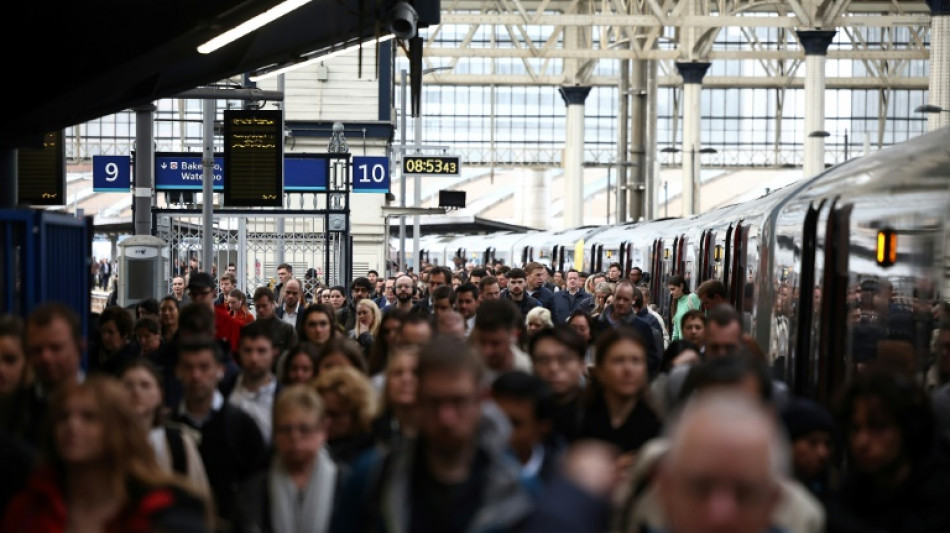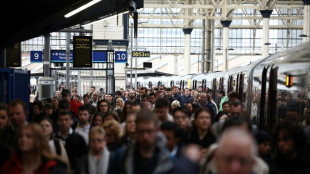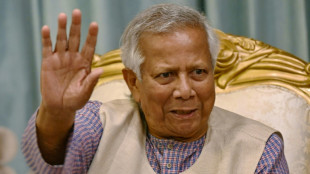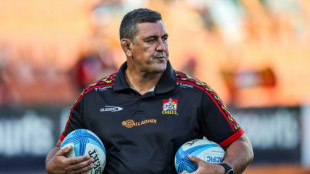
-
 India's new Test captain Gill falls cheaply in IPL
India's new Test captain Gill falls cheaply in IPL
-
Suriname votes for new government to steer oil windfall

-
 Pope prays for runs against India and Australia
Pope prays for runs against India and Australia
-
Nadal to bid Roland Garros farewell as Sabalenka makes fast start

-
 Years of learning from best to help Alonso at Real Madrid
Years of learning from best to help Alonso at Real Madrid
-
Barca start plotting return to women's Champions League throne

-
 Real Madrid 'legend' Alonso returns as new coach
Real Madrid 'legend' Alonso returns as new coach
-
Lionesses' Euro triumph catalyst for Ohanian's Chelsea investment

-
 UK renationalises first train operator under Labour reforms
UK renationalises first train operator under Labour reforms
-
Syria to help locate missing Americans: US envoy

-
 Container ship sinks off India's south coast with hazardous cargo
Container ship sinks off India's south coast with hazardous cargo
-
Trier misses out on top Cannes prize again

-
 Indonesia, China agree to bolster ties ahead of ASEAN summit
Indonesia, China agree to bolster ties ahead of ASEAN summit
-
Norway's Trier is bridesmaid again at Cannes

-
 12 killed as Russia pummels Ukraine in fresh night of strikes
12 killed as Russia pummels Ukraine in fresh night of strikes
-
Opposition vows boycott as Venezuela holds divisive new vote

-
 Bangladesh's Yunus seeks unity with fresh political talks
Bangladesh's Yunus seeks unity with fresh political talks
-
Nine killed in Ukraine as it trades fire with Russia overnight

-
 Timberwolves silence Thunder to tighten NBA playoff series
Timberwolves silence Thunder to tighten NBA playoff series
-
Chinese 12-year-old Yu Zidi set for world stage after stunning swims

-
 Three killed in Kyiv region as Russia, Ukraine trade drone fire
Three killed in Kyiv region as Russia, Ukraine trade drone fire
-
T-Wolves silence Thunder to tighten NBA playoff series

-
 'It's in our blood': how Vietnam adopted the Latin alphabet
'It's in our blood': how Vietnam adopted the Latin alphabet
-
In India's congested cities, delivery apps cash in

-
 Messi and Miami fight back for 3-3 draw at Philadelphia
Messi and Miami fight back for 3-3 draw at Philadelphia
-
Chiefs grab Super Rugby top spot with record-breaking Moana romp

-
 Nadal to bid Roland Garros farewell, Sabalenka starts title bid
Nadal to bid Roland Garros farewell, Sabalenka starts title bid
-
Informal therapy offers healing at George Floyd memorial

-
 George Floyd's uncertain legacy is marked five years on
George Floyd's uncertain legacy is marked five years on
-
Syria reboots interior ministry as Damascus seeks to reassure West

-
 ELEKTROS INC. SURGES AHEAD: Lightning Strike Lithium Discovery Supercharges the EV Revolution
ELEKTROS INC. SURGES AHEAD: Lightning Strike Lithium Discovery Supercharges the EV Revolution
-
Eastern River to Introduce Bond ETFs and Launch a New Fixed-Income Fund to Broaden Investment Offering

-
 DEA's Internal Marijuana Resistance: MMJ BioPharma Delays Reflect a Wider Cannabis Rescheduling Crisis
DEA's Internal Marijuana Resistance: MMJ BioPharma Delays Reflect a Wider Cannabis Rescheduling Crisis
-
Bae holds on to LPGA lead in Mexico

-
 Schmid and Griffin share lead with Scheffler lurking at Colonial
Schmid and Griffin share lead with Scheffler lurking at Colonial
-
Filipino trailblazer Eala set for Grand Slam debut in Paris

-
 'Up for anything': Stuttgart eye Berlin nightlife after cup triumph
'Up for anything': Stuttgart eye Berlin nightlife after cup triumph
-
How 'calm' Arsenal dethroned women's Champions League giants Barca

-
 PSG beat Reims to win French Cup ahead of Champions League final
PSG beat Reims to win French Cup ahead of Champions League final
-
At 2nd inauguration, Noboa vows to 'save' Ecuador from gangs

-
 Iraq's first ever director in Cannes wins best feature debut
Iraq's first ever director in Cannes wins best feature debut
-
Dissident Iranian filmmaker Panahi wins Cannes top prize

-
 Stuttgart survive late Bielefeld scare to win German Cup
Stuttgart survive late Bielefeld scare to win German Cup
-
'Palme d'Or whisperer': US distributor Neon picks Cannes winner again

-
 Three things we learned from England's rout of Zimbabwe
Three things we learned from England's rout of Zimbabwe
-
'I only feel pain': Barca's Putellas after Champions League defeat

-
 After brief X outage, Musk says refocusing on businesses
After brief X outage, Musk says refocusing on businesses
-
Le Bris hails Sunderland's 'impossible' promotion to Premier League

-
 Iranian filmmaker Panahi urges 'freedom' as he wins Cannes top prize
Iranian filmmaker Panahi urges 'freedom' as he wins Cannes top prize
-
Hamilton hit with three-place grid penalty in Monaco


UK renationalises first train operator under Labour reforms
A private train operator servicing parts of southern England, including London, on Sunday became the first to be returned to public ownership under a government plan to renationalise Britain's much-maligned railways.
All UK rail operators are due to be renationalised within the next two years in a key policy launched by Prime Minister Keir Starmer following his Labour party's return to government last July after 14 years in opposition.
"South Western Railway is now under public ownership. And this is just the start," Starmer said on X, formerly Twitter, naming the service kickstarting his government's plan.
He vowed the renationalisation "will put passengers first", with "better services, with simpler ticketing, on more comfortable trains".
Train passengers in Britain suffer from frequent cancellations, in addition to high ticket prices and regular confusion over which services they can be used on.
The privatisation of rail operations took place in the mid-1990s under the Conservative prime minister of the time, John Major, but the rail network remained public, run by Network Rail.
Four of the 14 operators in England are already run by the state owing to poor performance in recent years, but this was originally meant to be a temporary fix before a return to the private sector.
Labour triumphed over the Conservative party in elections last year, with its manifesto including promises to fix the country's ailing transport services.
Legislation was approved in November to bring rail operators into public ownership when the private companies' contracts expire -- or sooner in the event of poor management –- and be managed by "Great British Railways".
Transport Secretary Heidi Alexander said in a statement that will end "30 years of fragmentation", but warned that "change isn't going to happen overnight".
- 'Public good' -
"We've always been clear that public ownership isn't a silver bullet, but we are really firing this starting gun in that race for a truly 21st-century railway, and that does mean refocusing away from private profit and towards the public good," she added.
In an example of how passengers might not immediately notice much difference, South Western's first service under public ownership on Sunday was set to include a rail replacement bus because of engineering work.
Government figures show that the equivalent of four percent of train services in Britain were cancelled in the year to April 26.
The rate was three percent for South Western.
Rail unions -- which have staged a stream of strikes in recent years over pay and conditions due to a cost-of-living crisis -- welcomed the state takeover.
"We're delighted that Britain's railways are being brought back where they belong -- into the public sector," said Mick Whelan, general secretary of union Aslef.
"Everyone in the rail industry knows that privatisation... didn't, and doesn't, work," he added.
Two operators serving towns and cities in southeastern and eastern England are next to be brought back into public ownership by late 2025.
All the current contracts are set to expire by 2027.
UK media reported that the renationalisation of South Western means a third of journeys are now on publicly owned services.
The government has said renationalisation will save up to £150 million ($200 million) per year because it will no longer have to pay compensation fees to rail operators.
The main rail operators in Scotland and Wales, where transport policy is handled by the devolved administrations in Edinburgh and Cardiff, are also state-owned.
X.Karnes--AMWN